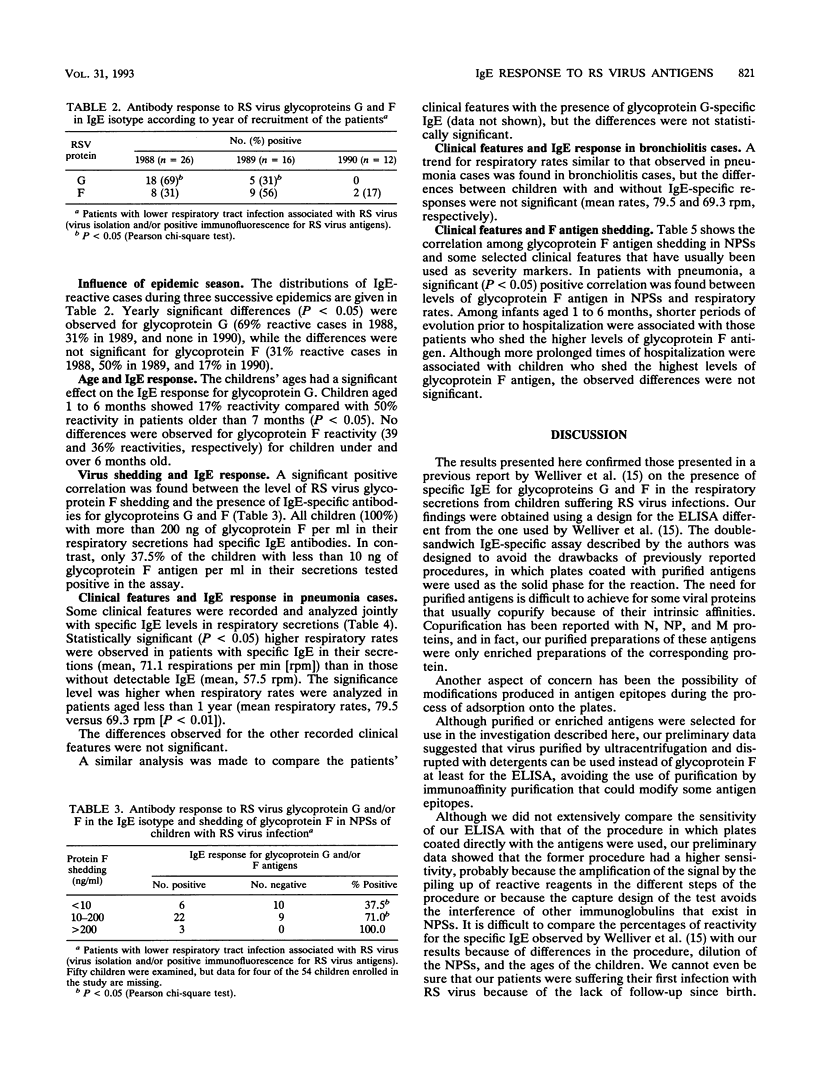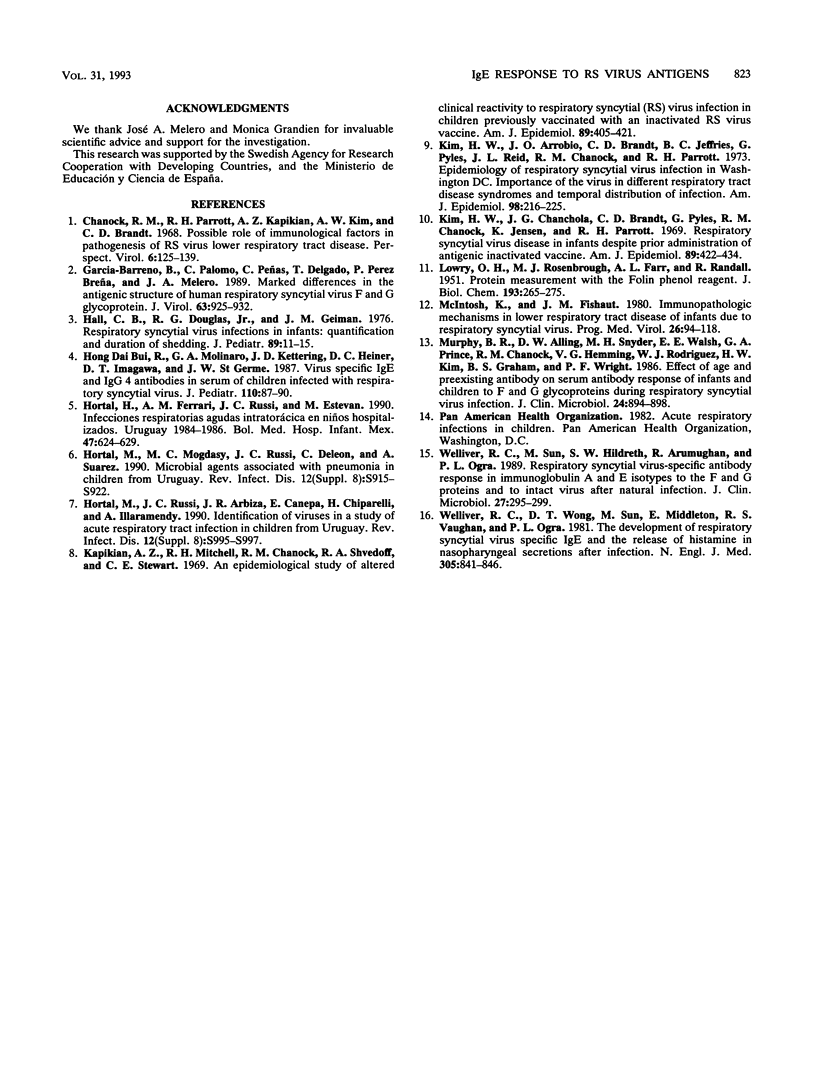Abstract
Enzyme immunoassays were developed to detect the presence of specific immunoglobulin E (IgE) antibodies and respiratory syncytial (RS) virus structural proteins in nasopharyngeal secretions in order to improve the knowledge on some aspects of the pathogenesis of severe acute lower respiratory tract infections caused by RS virus. These assays were used to analyze clinical specimens from children with RS virus-associated infections (bronchiolitis and pneumonia), and the findings were correlated with the patients' clinical symptoms. The results indicate the presence of specific IgE against the two external glycoproteins (G and F) and the absence of detectable IgE levels for the internal viral antigens. There was a correlation between the levels of IgE-specific antibodies and the amount of viral protein F in the secretions, indicating that the IgE response against the viral glycoproteins might be related to the antigen load. In addition, a correlation was found between higher levels of both viral protein F-specific IgE and F antigen with higher respiratory rates in children with pneumonia. These findings may be relevant because they suggest an association between the virus load and the immune response in the pathogenesis of RS virus infections.
Full text
PDF




Selected References
These references are in PubMed. This may not be the complete list of references from this article.
- Bui R. H., Molinaro G. A., Kettering J. D., Heiner D. C., Imagawa D. T., St Geme J. W., Jr Virus-specific IgE and IgG4 antibodies in serum of children infected with respiratory syncytial virus. J Pediatr. 1987 Jan;110(1):87–90. doi: 10.1016/s0022-3476(87)80295-0. [DOI] [PubMed] [Google Scholar]
- García-Barreno B., Palomo C., Peñas C., Delgado T., Perez-Breña P., Melero J. A. Marked differences in the antigenic structure of human respiratory syncytial virus F and G glycoproteins. J Virol. 1989 Feb;63(2):925–932. doi: 10.1128/jvi.63.2.925-932.1989. [DOI] [PMC free article] [PubMed] [Google Scholar]
- Hall C. B., Douglas R. G., Jr, Geiman J. M. Respiratory syncytial virus infections in infants: quantitation and duration of shedding. J Pediatr. 1976 Jul;89(1):11–15. doi: 10.1016/s0022-3476(76)80918-3. [DOI] [PubMed] [Google Scholar]
- Hortal de Peluffo M., Ferrari A. M., Russi-Cahill J. C., Estevan M. Infecciones respiratorias agudas intratorácicas en niños hospitalizados. Uruguay 1984-1986. Bol Med Hosp Infant Mex. 1990 Sep;47(9):624–629. [PubMed] [Google Scholar]
- Hortal M., Mogdasy C., Russi J. C., Deleon C., Suarez A. Microbial agents associated with pneumonia in children from Uruguay. Rev Infect Dis. 1990 Nov-Dec;12 (Suppl 8):S915–S922. doi: 10.1093/clinids/12.supplement_8.s915. [DOI] [PubMed] [Google Scholar]
- Hortal M., Russi J. C., Arbiza J. R., Canepa E., Chiparelli H., Illarramendi A. Identification of viruses in a study of acute respiratory tract infection in children from Uruguay. Rev Infect Dis. 1990 Nov-Dec;12 (Suppl 8):S995–S997. doi: 10.1093/clinids/12.supplement_8.s995. [DOI] [PubMed] [Google Scholar]
- Kapikian A. Z., Mitchell R. H., Chanock R. M., Shvedoff R. A., Stewart C. E. An epidemiologic study of altered clinical reactivity to respiratory syncytial (RS) virus infection in children previously vaccinated with an inactivated RS virus vaccine. Am J Epidemiol. 1969 Apr;89(4):405–421. doi: 10.1093/oxfordjournals.aje.a120954. [DOI] [PubMed] [Google Scholar]
- Kim H. W., Arrobio J. O., Brandt C. D., Jeffries B. C., Pyles G., Reid J. L., Chanock R. M., Parrott R. H. Epidemiology of respiratory syncytial virus infection in Washington, D.C. I. Importance of the virus in different respiratory tract disease syndromes and temporal distribution of infection. Am J Epidemiol. 1973 Sep;98(3):216–225. doi: 10.1093/oxfordjournals.aje.a121550. [DOI] [PubMed] [Google Scholar]
- Kim H. W., Canchola J. G., Brandt C. D., Pyles G., Chanock R. M., Jensen K., Parrott R. H. Respiratory syncytial virus disease in infants despite prior administration of antigenic inactivated vaccine. Am J Epidemiol. 1969 Apr;89(4):422–434. doi: 10.1093/oxfordjournals.aje.a120955. [DOI] [PubMed] [Google Scholar]
- LOWRY O. H., ROSEBROUGH N. J., FARR A. L., RANDALL R. J. Protein measurement with the Folin phenol reagent. J Biol Chem. 1951 Nov;193(1):265–275. [PubMed] [Google Scholar]
- McIntosh K., Fishaut J. M. Immunopathologic mechanisms in lower respiratory tract disease of infants due to respiratory syncytial virus. Prog Med Virol. 1980;26:94–118. [PubMed] [Google Scholar]
- Murphy B. R., Alling D. W., Snyder M. H., Walsh E. E., Prince G. A., Chanock R. M., Hemming V. G., Rodriguez W. J., Kim H. W., Graham B. S. Effect of age and preexisting antibody on serum antibody response of infants and children to the F and G glycoproteins during respiratory syncytial virus infection. J Clin Microbiol. 1986 Nov;24(5):894–898. doi: 10.1128/jcm.24.5.894-898.1986. [DOI] [PMC free article] [PubMed] [Google Scholar]
- Welliver R. C., Sun M., Hildreth S. W., Arumugham R., Ogra P. L. Respiratory syncytial virus-specific antibody responses in immunoglobulin A and E isotypes to the F and G proteins and to intact virus after natural infection. J Clin Microbiol. 1989 Feb;27(2):295–299. doi: 10.1128/jcm.27.2.295-299.1989. [DOI] [PMC free article] [PubMed] [Google Scholar]
- Welliver R. C., Wong D. T., Sun M., Middleton E., Jr, Vaughan R. S., Ogra P. L. The development of respiratory syncytial virus-specific IgE and the release of histamine in nasopharyngeal secretions after infection. N Engl J Med. 1981 Oct 8;305(15):841–846. doi: 10.1056/NEJM198110083051501. [DOI] [PubMed] [Google Scholar]


